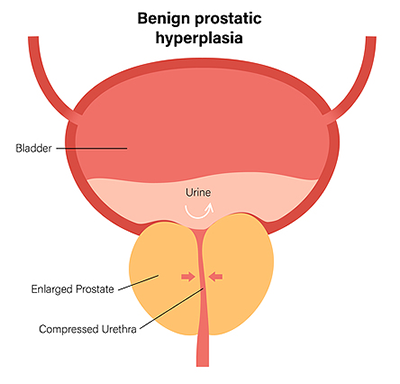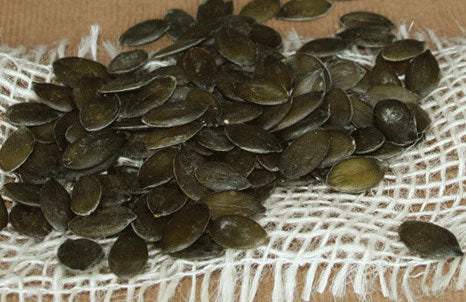Bladder Problems? Don’t Accept It – Treat It, Naturally

Urinary and bladder problems are serious health concerns for both men and women that become increasingly common as we age. Fortunately, there are longstanding orthomolecular therapies available for the treatment of urinary incontinence, overactive bladder, urinary tract infections, and male bladder outlet obstruction. “Orthomolecular medicine” refers to using supplements that are natural to the body to restore and maintain health, as opposed to treatment with pharmaceutical drugs. Clinical studies have proven there are significant benefits to using these traditional natural therapies, without the sometimes serious adverse effects associated with prescription drugs.
About 50% of men over the age of 50, and up to 90% of men older than 80 suffer from bladder outlet obstruction, which is usually caused by an enlarged prostate gland. For the technically inclined, the condition is called BPH, for benign prostatic hyperplasia – where “hyperplasia” describes the enlargement of an organ caused by an increase in the reproduction rate of its cells. About the size of a walnut, the prostate gland surrounds the urethra (the tube that connects the urinary bladder to the penis), and produces fluid to nourish and transport sperm. When it grows in size, it compresses the urethra, making it difficult to empty the bladder.

Hormonal Imbalance
An enlarged prostate can be caused by a hormonal imbalance between androgens and estrogens, particularly the overproduction of the enzyme 5-alpha-reductase which converts testosterone to dihydrotestosterone (DHT). Elevated DHT levels can cause hair loss, coronary heart disease, prostate cancer, and an enlarged prostate. Aromatase is another enzyme that can increase testosterone levels.
There are commonly used prescription drugs like Proscar and Avodart that inhibit 5-alpha-reductase, but they are associated with a variety of adverse effects including erectile dysfunction and lower libido. I'm happy to report that there are many natural products including Styrian pumpkin seed oil, plant sterols (especially beta-sitosterol), and defined rye flower pollen extract that can help resolve bladder outlet obstruction by shrinking an enlarged prostate gland. These natural treatments can help restore the normal flow of urine through the urethra. In addition, studies have shown that Styrian pumpkin seed oil can strengthen bladder tissue to help the bladder contract and expand, and can be effective in reducing the symptoms of an overactive bladder.

Styrian Pumpkin Seed Oil
Grown only in Styria, a mountainous, forested state in southern Austria, the Styrian pumpkin produces seeds with remarkable healing qualities. These pumpkin seeds have a thin coating instead of a shell, making the entire seed edible. Styrian pumpkin seeds and the oil produced from them are unique in their health benefits. Styrian pumpkin seed oil has been shown to inhibit the production of both aromatase and 5-alpha-reductase, the problematic enzymes. An added bonus is that the oil has a delicious, nutty flavour and can be a wonderful addition to salads, especially when combined with a quality extra virgin olive oil.
A 2019 German study confirmed that an extract of Styrian pumpkin seed oil significantly reduced BPH symptoms after only four weeks, which continued to improve after eight and twelve weeks. Of twenty subjects, only one remained with severe symptoms - a remarkable result. Over 60% of the men in this study reported an improvement in their quality of life. In addition, nocturia (getting up more than once at night to urinate) declined as the study progressed. Similarly, a subsequent twelve-week study of 2,245 German patients suffering from BPH found that pumpkin seed oil capsules reduced symptoms by 41.4%, while quality of life improved by 46.1%.
I recommend combining Styrian pumpkin seed oil (10 grams, or 2 teaspoons), with Prostate Perform, the most complete nutritional supplement for prostate support. This powerful formula includes rye flower pollen extract, beta-sitosterol, cranberry extract, stinging nettle, and the amino acids glycine, alanine, and glutamic acid. Many of my clients have reported that not only did their urine flow improve substantially (in some cases in one or two days), but they also noticed improved sexual function (particularly in the mornings) when the two products were combined.
Lower Urinary Tract Symptoms
Urinary incontinence, overactive bladder, and post micturition (urination) dribble are collectively referred to as lower urinary tract symptoms (LUTS). LUTS consists of three major groups including storage (increased day frequency, nocturia, urgency, and urinary incontinence), problems voiding (slow stream, straining, intermittency, dribble), and post-urination (dribble and incomplete emptying of the bladder).
If you wake up more than once a night to urinate, or can't sleep for 6-8 hours without needing to use the bathroom, you may be suffering from nocturia. Nocturia can result if the body produces too much urine, or if you have poor bladder control. Nocturia can be a side effect of some pharmaceutical drugs, or from simply drinking too much before bed (including water, alcohol, or caffeinated beverages). It can also be a sign of underlying health conditions including diabetes, high blood pressure, cardiovascular disease, enlarged prostate (BPH), or be related to one or more of the three lower urinary tract symptoms.
Storage LUTS (urinary incontinence and overactive bladder) are disturbing and embarrassing conditions suffered by an estimated 15% of the population. This includes an estimated 33 million Americans, with over one-third of them also suffering from urgency incontinence where there is a strong urge to urinate that is difficult to delay, which can result in leakage. A 2002 study of Canada, Germany, Italy, Sweden, and the UK found that about 12% suffered from overactive bladder, and about 9.4% suffered from urinary incontinence.
Approximately 25% of women of reproductive age, about half of post-menopausal women, and up to 75% of women in nursing homes suffer from stress and urgency urinary incontinence (UI). Often underdiagnosed, many women consider UI to be a normal part of aging. Factors that contribute to UI in women include childbirth, constipation, being overweight, and having had a hysterectomy or prolapse repair. For men, common causes of urinary incontinence include blockage from an enlarged prostate gland, diabetes, Parkinson's disease, and prostate surgery.
One treatment option for UI and overactive bladder is bladder retraining, a behavioral therapy that can help regain control of urination. With this approach, you practice holding in urine for progressively longer periods of time, which can help prevent leaks and emergencies. There are also a variety of pharmaceutical therapies, but most are associated with side effects including dry mouth, dry eyes, constipation, blurred vision, nausea, drowsiness, memory loss, and an increased risk of cognitive impairment, including dementia that can be permanent.
Urox
In terms of natural solutions, Styrian pumpkin seed oil and Urox Bladder Control have both been clinically studied for LUTS. In a 2014 Japanese study of 25 males and 20 females aged 41-80 years, researchers found that two teaspoons daily of Styrian pumpkin seed oil for 12 weeks significantly reduced overactive bladder symptoms.
Published in 2018, a randomized, double-blind, placebo-controlled Australian trial conducted at two primary care centres with 150 participants (59% female aged 63.5 +/-, over eight weeks) found that Urox Bladder Control was very effective.
Developed in Australia (and sold in the past in Canada as AOR Bladder Manager), Urox Bladder Control is a combination of Crataeva Nurvala (the herb of choice in Ayurvedic medicine for urinary disorders), Equisetum arvense (common horsetail, used in Western herbal medicine for urinary incontinence), and Lindera aggregate (popular in Chinese traditional medicine for frequent urination and urinary incontinence).
In the Australian study, Urox reduced daytime urination by two or three instances a day, cut nocturia occurrences in half, and slowed urgency episodes from an average of about four times a day to less than twice. Researchers also found it reduced the frequency of not making it to the bathroom in time from about three to once per day, and lowered stress incontinence (leaking) from over twice per day to less than once. The proportion of users that needed to use more than one pair of adult diapers or padded underwear dropped from 23% to 6% after only 8 weeks of use. Of the Urox users in this study, 60% fell within the normal daytime range, while almost 25% of those experiencing nocturia became symptom-free.
Increasingly common as we age and often difficult to talk about, the symptoms associated with urinary conditions are not to be accepted or ignored. Thankfully, there is nutritional support available from Styrian pumpkin seed oil and herbal formulas like Urox that can help address these conditions naturally.
Health Disclaimer. Copyright ©2021. Nathan Zassman is a trained nutrition practitioner and the owner of Aviva Natural Health Solutions.
